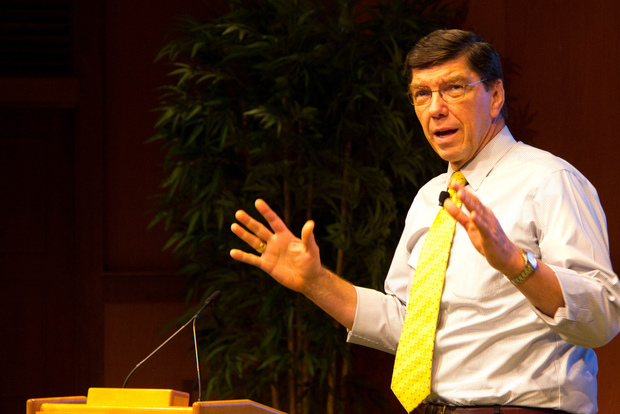Stanislav Polonsky, Samsung: ‘You should find out what may kill your project and deal with that’
On the threshold of the open lecture of Realnoe Vremya 'Business in the Era of Disruptive Innovations', our editorial board talked to the head of the advanced research and developments department of Samsung Stanislav Polonsky about the phenomenon of disruptive innovations. Read the details of how disruptive innovations affect business and everyday life and why it is important to understand the factors that may kill your project in the article of Realnoe Vremya.
To begin with, let's find out — what is a disruptive innovation?
There is a person, Clayton Christensen. He is s a Professor of Business Administration at the Harvard Business School. He defined this term. It is an objective law when science enters production and makes a big disruption.
A disruptive innovation is not just a science, it's not enough. You should clearly understand what business model will exist. But a business model is also not enough. Because the traditional organizations are often not structured to use something new. So we need new forms of organization.
A classic example is the personal computers. When the computing technology was democratized from mainframe, we came to PC. Most of the companies that made mainframes were found unable to trade in personal computers and failed. IBM and those who, generally speaking, failed. A new generation of companies that could implement these business models appeared. DELL succeeded due to this.
Disruptive innovation is like a set of observations. An example – Gutenberg, who invented the press and, in fact, democratized printing. There are a lot of such examples. If we know how technology was disrupting, we can use this experience to make a new disruption.

'Clayton Christensen is s a Professor of Business Administration at the Harvard Business School. He defined this term. It is an objective law when science enters production and makes a big disruption.' Photo: eltjam.com
Recently, a history professor at Harvard Jill Lepore said in her article that the findings of Christensen are based on his old research. So over time, all things that are built on his conclusions and on the basis of which the Silicon Valley lives, will lose relevance because the business will change. What do you think about this?
You are talking about the future. But we don't know the future. Now a disruption is taking place: adaptive educational technologies, mass parallel online education. Christensen predicted them. There is a disruption in medicine. We are now on a course for a scientific medicine when a doctor's intuition can be neglected.
When this is all will be done by the computers?
Not necessarily. There will be good measures. For example, interventional radiology (a treatment with the use of percutaneous accesses, catheters and other minimum invasive instruments, with no general anaesthesia). Before, a surgeon was needed to have a surgery on a knee. Now a radiologist without a serious surgical education three times cheaper will do the same operation on a knee without opening it up. This is also an example of a disruptive technology.
These people say: 'We do not know the future.' I agree. But the experience shows that often the future is a particular modification of the past.
So, is a disruptive innovation really a thing that drives progress?
I'll just give an example. PC is a more or less classic example of disruptive technology now — something that NVIDIA does. They worked in a niche market (cards for the players, graphics accelerators). And what have they done? They have democratized the supercomputers. In fact, there is a disrupt when the GPU is used everywhere, including for the scientific computing.
Yes, it's a small market. However, deep learning (a set of algorithms in machine learning and artificial intelligence, based on search due to which the computers can learn from its own experience) uses the GPU. In other words, this supercomputing technology has been maturing for a very long time, it is expensive. Then they found a niche where it grew up, democratized, become cheap and then it 'blew up' the whole world. There are a lot of such examples.

'I have already said today: if we learn to do the blood draws not from a vein but from a small puncture on a finger, and so that you can do a detailed analysis at home, it will be a disruption.' Photo: viplab.org
Are there disruptive innovations in social things?
Well, look at the schooling. It is a social or scientific technology? Probably, more social. And psychological trainings? Now they are ubiquitous. But before, they were only in large corporations. But now everyone started to attend them. My son is a fifth-grader and they already have psychological trainings.
Is it a disruptive technology? Again, I'm not a scientist who study a business model. First of all, I'm a physicist. I see what Clayton Christensen writes. For example, there is a disruption in medicine. I have already said today: if we learn to do the blood draws not from a vein but from a small puncture on a finger, and so that you can do a detailed analysis at home, it will be a disruption. We will no longer need to go to the laboratory to take a blood test, an integrated analysis can be done at home.
A speaker for our open lecture, a Volvo futurist Aric Dromi said that people should learn how to fail to make a breakthrough.
And do not be afraid to fail, yes. It is important not to make mistakes but to learn from these mistakes. That way you gain experience. I am 50 years old, I'm in business for 30 years and I can say that still most of the things goes to a paper basket, unfortunately. It is inevitable.

You should find out what may kill your project, and deal with it. If it is not killed — great! Proceed to the next step
Christensen wrote that you should know how to predict your mistakes, as far as I understood him. Is it possible to predict n-number of mistakes after which there will be the result?
According to the business statistics, in the language of startups, you will fail in six startups, and the seventh one will work out. There is another kind of thing, popular in the West: lean startup. They say, in particular, that you should predict your research so that if you can fail, you will fail instantly.
This is called a 'critical assumption'. You ask yourself the question: what can happen that may kill your project? When you define it, you should deal with it at first.
In other words, when you start a new thing, you know that it can be killed by A, B or C, but D, most likely, will not kill. So, at first you should deal with A, B, and C. If you fail, you will not waste your time and money to study D.
In fact, it is psychologically uncomfortable that many people neglect these safe things, from year to year putting off what is called skeletons in the cupboard. They think that it might not work out, but they do not want to talk about that. But in the end, you lose time, you make your efforts for what will never succeed. So, you should find out what may kill your project and deal with it. If it is not killed — great! Proceed to the next step.